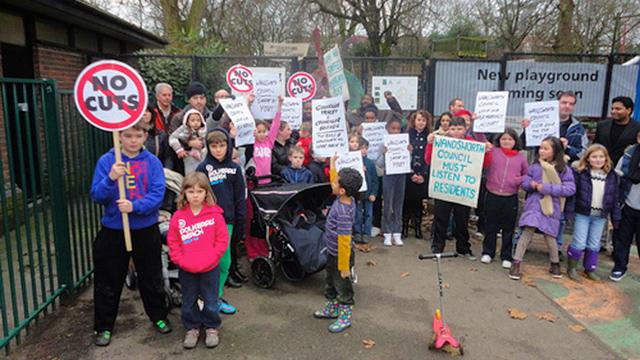
Activists from Occupy London have joined up with Wandsworth Against Cuts and local residents to stop the demolition of a community adventure playground in the south London borough.
A massive adventure area, built with input from children and young adults, is scheduled to be demolished; the three workers it employed have already been made redundant. Lydia, who resigned in protest against the decision, said in the summer holidays and weekends the playground catered to around 4,000 children up to the age of 16 years old.
It provided an environment where children could challenge themselves with adventure play. Numerous sessions were arranged from music and crafts to education and social sessions, such as anti-knife crime workshops.
Lydia described how this area was vital, as it meant the children and teenagers had safe adults around who were approachable. The workers were people whom the teenagers, especially, could feel safe speaking to with difficult issues they did not feel comfortable bringing to teachers or parents. With its closure, there are few alternatives for the teenagers, so many will only have the streets as a place to spend their time.
In support of the campaign to resist Wandsworth Borough’s planned cuts, Occupy London supporters have been camped in the play zone since January 5. A legal challenge is being formulated to stop the council demolishing the structures, which have been built with involvement from children.
A video, viewable on the Wandsworth Against Cuts website, shows the vibrant diversity of provisions that the adventure play area gives to the children and teenagers. This is summed up by a group of eight- to 14-year-olds. The interviewer asks, “Where will you go if they close the park?” The children reply collectively that they have nowhere, they don’t know. Another adds, “This is our second home,” followed by another comparing closing it to “throwing us out on the street.”
Angela, one of the occupiers, explained the camp has been widely supported by the local community, including the donation of tents, warm bedding and food. She said they would be camped in the playground for as long as it takes, and encouraged more to come and join the resistance.
One member of Wandsworth Against Cuts explained how the city's action to close and then attempt to shut down the adventure park went directly against local opinion. A survey by the local council showed almost nine out of 10 parents and caregivers wanted the park to stay open. The case has clear parallels to another campaign now happening in London: the fight to save a library in Friern Barnet.
In this northern borough, Capita, a company with a track record of financial irregularities and poor service provision, is being awarded 70% of the local services of the library. The borough’s old library was amongst the government cuts in April last year; in September, Occupy activists squatted the building and turned it into a community library. It now has more books and longer opening hours than previously. Despite this, the local council is trying to evict the librarian activists and close the building, which has become central in local community life.
The two examples - one a children's playground, the other a library - are indicative of a problem sweeping Britain, where local services are under threat by councils acting without the support or consent of the public.
In both places, locals have expressed disgust at the removal of the public services without consultations. People are voicing anger about the loss of democratic rights they took for granted. And the connections are now deepening in terms of resistance tactics, as local people join with activists from Occupy to stop the closures and privatizations. With further massive cuts and privatizations of public services planned across the country, the battles at Wandsworth and Friern Barnet are test cases for conflicts to come.
The government’s argument, of course, is that the deficit is the country’s biggest problem. They neglect to explain, however, that this is due to the banking crisis and that we are in massive debts because we bailed out the banks, not to mention losing billions of pounds through tax evasion by corporations and the wealthy. Government blames public spending, but it's government measures that are making it playtime for the rich as the gap between the elites and the majority stands at its biggest since the Second World War.
Before coming to office, Prime Minister David Cameron paid lip-service to an ill-defined idea about a “Big Society.” These words were contradicted by his actions to attack the majority by cutting and selling off public services. The camp at the playground, the squatting of the library and other acts of local resistance to austerity show the public's growing strength and rejection of government’s direction.
A few days ago when authorities attempted to evict a once derelict garden center, which had been turned into a home and repaired from ruin, a message one person shouted at authorities seemed to resonate with today's broader struggle of people against cuts: “Our society is bigger than yours!”
3 WAYS TO SHOW YOUR SUPPORT
- Log in to post comments
















